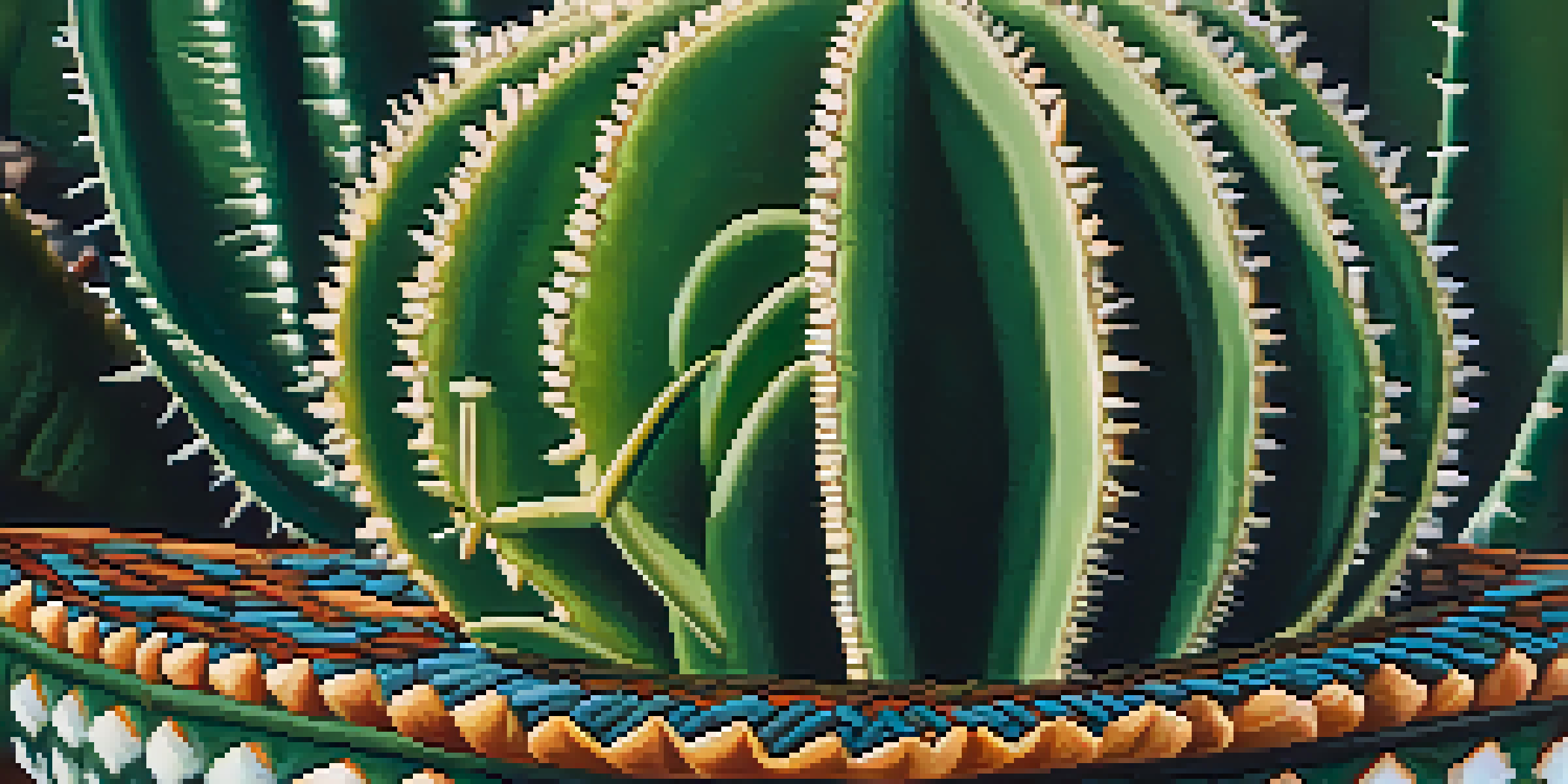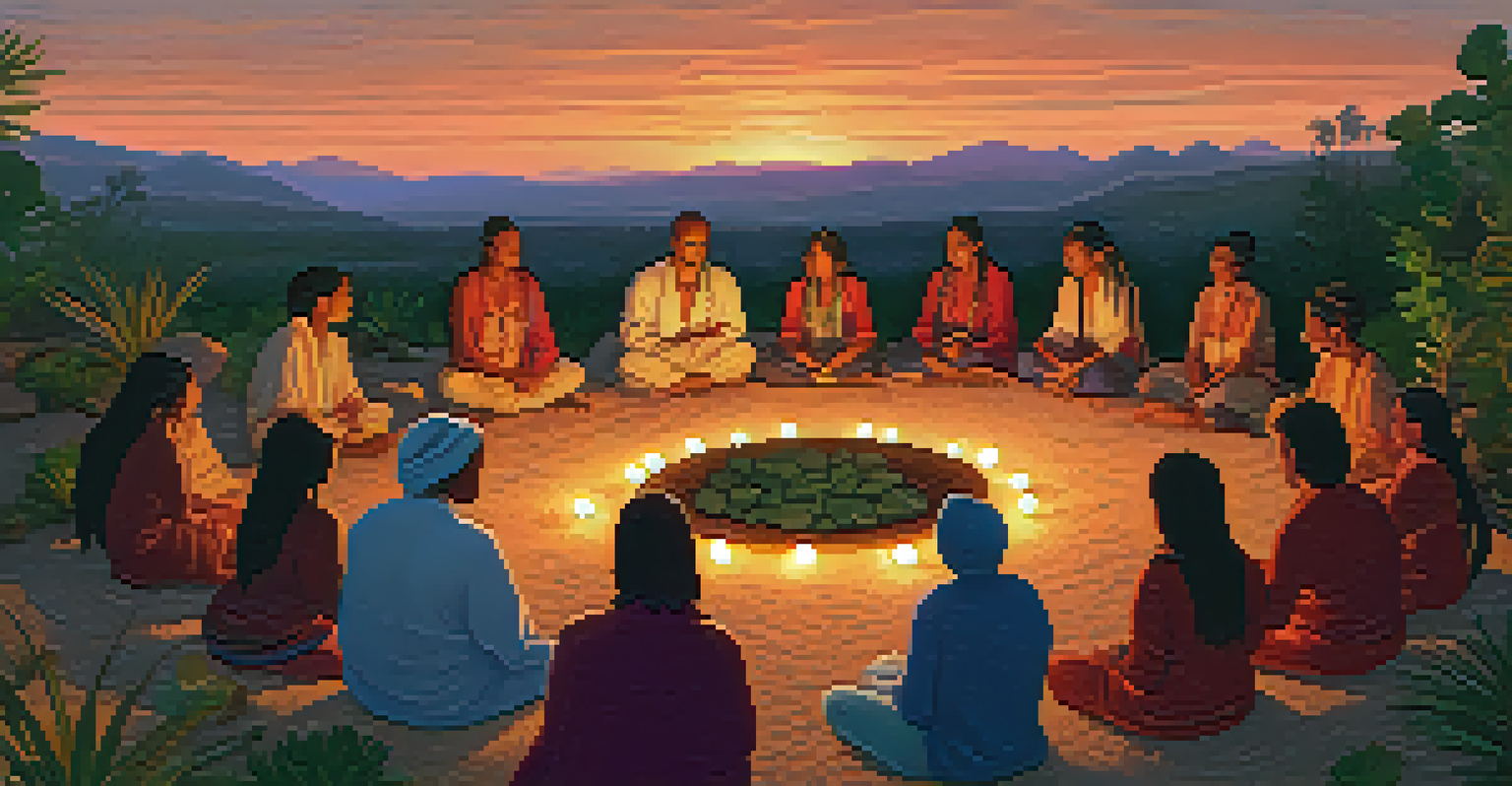Rituals and Identity: Peyote in Contemporary Communities

Understanding Peyote: A Brief Overview
Peyote is a small, spineless cactus native to Mexico and the southwestern United States, known for its psychoactive properties. Traditionally, it has been used in spiritual and religious ceremonies by Indigenous peoples. This unique cactus contains mescaline, a compound that alters perception and can lead to profound spiritual experiences. Understanding Peyote's cultural significance helps us appreciate its role in contemporary rituals.
The cactus is a symbol of patience and endurance, a reminder of the power of the earth and the spirit.
For many communities, Peyote is not just a plant; it's a sacred medicine that facilitates communication with the divine. The use of Peyote in rituals can evoke feelings of connection, introspection, and healing. Additionally, the experience of consuming Peyote is often framed within the context of a well-established set of rituals and practices that underscore its importance.
As society evolves, the meanings and applications of Peyote are also shifting, making it essential to explore its contemporary relevance. Many Indigenous groups continue to uphold traditional practices while also navigating modern challenges. This duality reflects a broader conversation about cultural preservation and adaptation.
Peyote in Indigenous Spiritual Practices
Indigenous communities have long revered Peyote for its spiritual significance, often incorporating it into healing ceremonies and communal gatherings. These practices create a sense of unity and shared identity among participants. During ceremonies, the experience is deeply communal, fostering bonds that transcend individual experiences.

The rituals surrounding Peyote involve not only the consumption of the cactus but also songs, prayers, and storytelling, which serve to reinforce cultural values and beliefs. This rich tapestry of practices ensures that the lessons learned during these experiences are passed down through generations. As such, Peyote becomes a thread that weaves together the past, present, and future of a community.
Peyote's Cultural Significance
Peyote is a sacred plant for Indigenous peoples, used in spiritual rituals that foster connection, healing, and cultural identity.
In recent years, there has been a resurgence of interest in these spiritual practices, prompting younger generations to reconnect with their cultural roots. This revival is not merely a return to tradition but also an adaptation that embraces contemporary challenges. By weaving modern elements into their rituals, communities can ensure the relevance of Peyote in their lives today.
The Role of Peyote in Personal Identity Formation
Engaging with Peyote can lead to profound personal insights, helping individuals define their identities within the context of their community. Many who participate in Peyote ceremonies report transformative experiences that clarify their values and beliefs. This personal journey is often intertwined with a collective identity, highlighting the interplay between the individual and the group.
We are all connected to each other, to the earth, and to the universe. Peyote teaches us that unity and understanding are keys to personal and communal healing.
For many, Peyote serves as a bridge between their cultural heritage and modern existence. By participating in these rituals, individuals can explore their ancestral roots while developing a contemporary understanding of self. This dual exploration fosters a richer sense of identity that honors the past while embracing the present.
As modern society continues to change, the role of Peyote in personal identity formation becomes even more crucial. It offers a space for reflection and connection, allowing individuals to navigate their place within both their immediate community and the wider world. This journey of self-discovery through Peyote remains essential for those seeking authenticity in their lives.
Contemporary Challenges Facing Peyote Use
The increasing popularity of Peyote has brought various challenges, particularly concerning its sustainability and ethical use. Overharvesting and habitat loss threaten the cactus, raising questions about how to preserve this sacred plant for future generations. Balancing demand with ecological preservation is a pressing issue that communities must address.
Additionally, as Peyote gains attention outside Indigenous circles, concerns about cultural appropriation arise. The commercialization of Peyote could dilute its spiritual significance and undermine traditional practices. It is essential for non-Indigenous individuals to approach Peyote with respect and understanding, recognizing its deep cultural roots.
Identity Formation Through Peyote
Engaging with Peyote allows individuals to explore their cultural heritage while shaping their contemporary identities.
Communities are actively working to navigate these challenges, emphasizing the importance of education and advocacy. By raising awareness about the significance of Peyote and its rituals, they can foster a greater appreciation for its cultural heritage. This proactive approach not only protects the plant but also ensures that the spiritual practices surrounding it remain vibrant and respected.
Peyote and Community Bonding
Peyote ceremonies often serve as powerful tools for community bonding, bringing people together to share experiences and support one another. During these gatherings, individuals can express their emotions, share stories, and strengthen relationships in a nurturing environment. This communal aspect of Peyote use is vital for maintaining social cohesion among community members.
The rituals surrounding Peyote also provide a framework for collective healing. Participants often engage in discussions about personal and shared struggles, fostering a sense of belonging and understanding. This shared vulnerability helps to create a supportive atmosphere where individuals can grow together.
Through these communal experiences, the identity of the group is reinforced, as members collectively navigate their spiritual journeys. This bonding is crucial, especially in a world that can often feel isolating. Peyote acts as a catalyst for connection, reminding participants of the strength found in unity and shared purpose.
The Future of Peyote in Contemporary Practices
As discussions around cultural preservation and adaptation continue, the future of Peyote in contemporary practices remains an important topic. Many communities are exploring innovative ways to integrate traditional rituals with modern practices, ensuring that Peyote remains relevant in today's world. This evolution reflects a dynamic relationship with cultural heritage.
Education plays a key role in shaping the future of Peyote practices. By sharing knowledge about its significance and proper usage, communities can empower younger generations to carry on these traditions. This educational focus also helps to combat stereotypes and misconceptions surrounding Peyote and its use.
Challenges of Peyote Sustainability
The increasing popularity of Peyote raises concerns about sustainability and cultural appropriation, prompting communities to advocate for its preservation.
Ultimately, the future of Peyote lies in the hands of those who respect its cultural roots while exploring new pathways for expression and connection. As communities adapt, they can ensure that Peyote remains a vital part of their identity and spiritual practice for years to come.
Conclusion: Embracing Peyote's Legacy
Peyote's role in contemporary communities goes far beyond its psychoactive properties; it embodies a rich cultural legacy that continues to evolve. As individuals and communities navigate the challenges of modern life, Peyote offers a unique avenue for connection, healing, and self-discovery. Embracing this legacy can lead to a deeper understanding of identity and community.
The ongoing dialogue about Peyote's significance emphasizes the importance of cultural preservation and respect for traditional practices. By engaging with Peyote mindfully, individuals can enrich their lives while honoring the wisdom of those who came before. This balance is crucial for sustaining both the plant and the rituals that surround it.

In conclusion, Peyote serves as a powerful symbol of identity and community, uniting people across generations. As we move forward, it is essential to approach this sacred plant with reverence, ensuring that its spiritual and cultural significance is celebrated and preserved for future generations.